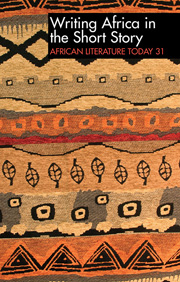Book contents
- Frontmatter
- Dedication: Chinua Achebe Joins the Ancestors
- Stop Press/ Tribute to Kofi Awoonor 1935–2013
- Contents
- Notes on Contributors
- Editorial Article
- Articles
- “Real Africa”/“Which Africa?”: The Critique of Mimetic Realism in Chimamanda Ngozi Adichie's Short Fiction
- Writing Apartheid: Miriam Tlali's Soweto Stories
- Articulations of Home & Muslim Indentity in the Short Stories of Leila Aboulela
- Ugandan Women in Contest with Reality: Mary K. Okurutu's A Women's Voice & the Women's Future
- Snapshots of the Botswana Nation: Bessie Head's The Collector of Treasures & Other Botswana Village Tales as a National Project
- Widowhood – Institutionalized Dead Weight to Personal Identity & Dignity: A Reading of Ifeoma Okoye's The Trial & Other Stories
- Feminist Censure of Marriage in Islamic Societies: A Thematic Analysis of Alifa Rifaat's Short Stories
- Diaspora Identities in Short Fiction by Chimamanda Ngozi Adichie & Sefi Atta
- Exposition of Apartheid South African Violence & Injustice in Alex la Guma's Short Stories
- Locating a Genre: Is Zimbabwe a Short Story Country?
- Mohammed Dib's Short Stories on the Memory of Algeria
- Ama Ata Aidoo's Short Stories: Empowering the African Girl-Child
- Ama Ata Aidoo: an Interview for ALT
- Reviews
Ama Ata Aidoo: an Interview for ALT
from Articles
Published online by Cambridge University Press: 05 December 2013
- Frontmatter
- Dedication: Chinua Achebe Joins the Ancestors
- Stop Press/ Tribute to Kofi Awoonor 1935–2013
- Contents
- Notes on Contributors
- Editorial Article
- Articles
- “Real Africa”/“Which Africa?”: The Critique of Mimetic Realism in Chimamanda Ngozi Adichie's Short Fiction
- Writing Apartheid: Miriam Tlali's Soweto Stories
- Articulations of Home & Muslim Indentity in the Short Stories of Leila Aboulela
- Ugandan Women in Contest with Reality: Mary K. Okurutu's A Women's Voice & the Women's Future
- Snapshots of the Botswana Nation: Bessie Head's The Collector of Treasures & Other Botswana Village Tales as a National Project
- Widowhood – Institutionalized Dead Weight to Personal Identity & Dignity: A Reading of Ifeoma Okoye's The Trial & Other Stories
- Feminist Censure of Marriage in Islamic Societies: A Thematic Analysis of Alifa Rifaat's Short Stories
- Diaspora Identities in Short Fiction by Chimamanda Ngozi Adichie & Sefi Atta
- Exposition of Apartheid South African Violence & Injustice in Alex la Guma's Short Stories
- Locating a Genre: Is Zimbabwe a Short Story Country?
- Mohammed Dib's Short Stories on the Memory of Algeria
- Ama Ata Aidoo's Short Stories: Empowering the African Girl-Child
- Ama Ata Aidoo: an Interview for ALT
- Reviews
Summary
Maureen Eke: What do you see as the place of the short story in African literature?
Ama Ata Aidoo: I think the short story is unfortunately rather misrepresented. As somebody who has also worked with that other ‘brief’ genre, poetry, I have found that African scholars and teachers have paid attention only to the novel. This is to be lamented.
Vincent Odamtten: Sometimes people accuse me of over-reading No Sweetness Here (1970), but when I look at your collection there is a sense of an interrogation of the moment after independence: you use the notion of post-independence to interrogate women's lives in particular, and the society's life more generally, and you ask what it means to be independent. The stories that you selected seem to have this bond between them. What choices do you make to select particular stories for your collections? What motivates you, and what is the controlling paradigm that you use to include one short story and exclude another?
Ama Ata Aidoo: First of all, I think that any kind of attention to one's work is valuable as far as a writer is concerned. Even the most outlandish readings into my stories, my poems, my novels or my plays, are most welcome! If you don't talk about a piece of work, then you are killing it; you may not actively intend to kill it, but as I said earlier this afternoon [in the M. K. O. Abiola Lecture, ‘Clapping With One Hand, Or A Fundamentally Flawed Management of Post-Colonial African Public Spaces’], we can do all we want as writers, but if people don't read us and don't talk about our work, our books are not worth much because it is the interaction that completes the work.
- Type
- Chapter
- Information
- Writing Africa in the Short Story , pp. 162 - 168Publisher: Boydell & BrewerPrint publication year: 2013

